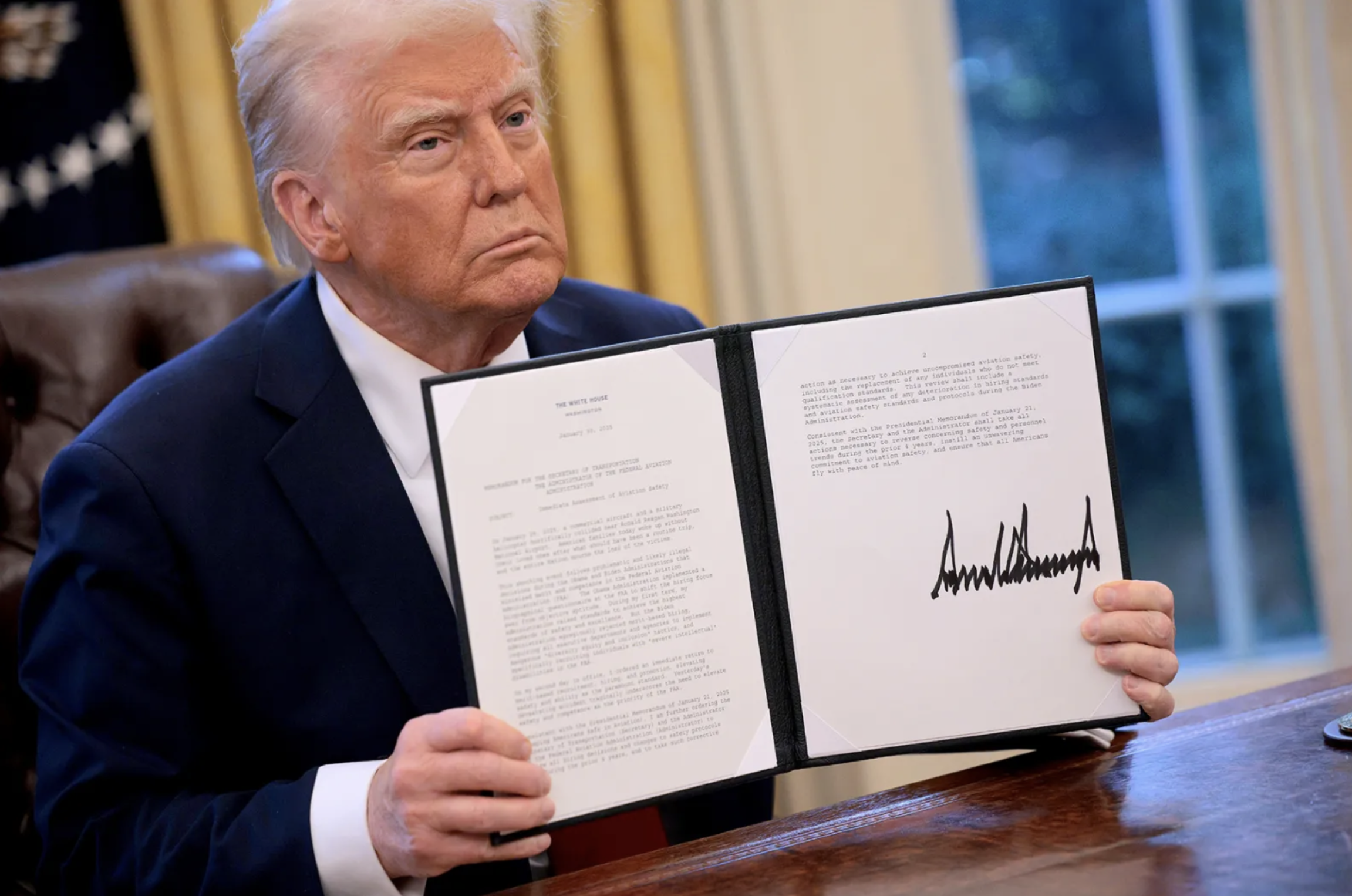Page header image: President Donald Trump holds up a memorandum he signed relating to DEI in the Oval Office at the White House on January 30, 2025. Chip Somodevilla/Getty Images
On March 28, 2025, a letter was sent to French firms by the Trump administration, asking that they comply with anti-DEI (Diversity, Equity, Inclusion) policy standards. Revealed by the French daily Les Echos, it requested a sworn statement from these companies stating they will comply with these measures within five days if these firms were to continue doing business with the United States.
DEI policies are frameworks which promote fair treatment and inclusion—especially of groups with a history of suffering discrimination or being underrepresented. They ensure equality of opportunity within an unequal population. DEI rests on the same principle as affirmative action programmes: righting past wrongs. Affirmative action, however, is more targeted than DEI, using quotas or special consideration for representation of minority groups. The latter have a broader aim of cultural and structural fairness–through diversity, equity, and inclusion.
On January 9, 2025, Elon Musk replied to a post on X which featured a clip of former Los Angeles Fire Department Chief Kristen Crowley voicing support for DEI initiatives in her department. The original post to which Musk replied denounced Crawley’s statement, suggesting that the department’s spending on DEI had taken money away from fire prevention. Musk echoed that sentiment, saying: “DEI means people DIE.”. This is just one of many posts by Musk denouncing the initiatives. Others include: “DEI is racism and sexism” on January 3, “DEI means people will DIE” on January 12, “Time for DEI to DIE” on February 12. Perhaps most strikingly, he posted on April 15: “DEI is a civil rights violation.” Musk, like the current president and his administration, sees DEI as a racist attack against White Americans. The White House has repeatedly attacked DEI on the basis that it hinders the recognition and valorisation of merit.
This is not a new rhetoric. Trump’s first term was also marked by attacks on inclusion initiatives. In 2018, the Department of Education and the Department of Justice abandoned Obama administration policies on affirmative action. At the time, then-House Minority Leader Nancy Pelosi called it “yet another clear Trump administration attack on communities of color.” The administration, on the other hand, defended the reversal as a way to stop discrimination against Asian Americans.
Now, in his second term, his administration has doubled down on anti-DEI policies. In 2023, the Supreme Court ruled that affirmative action in university admissions was impermissible.The Trump administration has interpreted this ruling more broadly, applying it to all K-12 schools. It has demanded that all states end diversity programmes in public schools at risk of losing federal funding. However, on April 23, District Judge Landya B. McCafferty blocked the administration’s ability to withhold funds from schools not conforming to these directives. Trump’s attacks on DEI extend beyond education; these policies have also been applied to the military, the federal government, and the private sector—which led to French firms receiving the infamous letters.
These actions remain highly contested. In his 25-hour speech in the Senate delivered from March 31 to April 1, Senator Booker, a Democrat from New Jersey, rejected the notion that DEI initiatives prevent the recognition of merit. He argued instead that these policies give everyone the opportunity to reach their potential and have their merit be seen and valued. Human Rights Watch has pointed out that the removal of positive discrimination also removes barriers to fight systemic racism. In fact, while the Trump administration terminated these “discriminatory programmes” on the basis of “serving every person with equal dignity and respect,” many actors argue that the initiatives were initially implemented to ensure an equal access to opportunities for all.
The government’s policies are causing ever-increasing concern amongst Americans. In this second term, Donald Trump’s administration is going beyond the limits it had reached during the president’s first term. However, Judge McCafferty’s ruling may be the first spark which unleashes a wildfire of resistance.
Other posts that may interest you:
- The Rise of the Far Right in Germany
- The Spanish Water Cycle, From Aridity to Downpour
- Europe: A New Age of Austerity?
Discover more from The Sundial Press
Subscribe to get the latest posts sent to your email.





